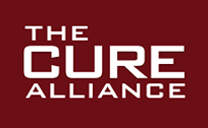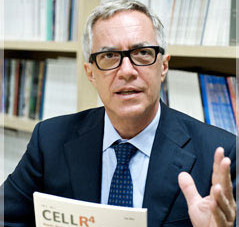U of M to Debate New Florida Law Friday
The Cure Alliance wants to hear from you. Is “informed consent” enough for terminally ill patients to try experimental drugs? Advocates argue the FDA’s compassionate use process is slow and bureaucratic. Opponents hold that, despite its flaws, the process is necessary to protect patients from potentially unsafe and ineffective drugs, and from the “therapeutic misconception,” or desperate patients’ view that any study is better than nothing. Hosted by Dr. Camilo Ricordi and Dr. Kenneth Goodman,the University of Miami discussion on pending Florida legislation will take place in the RSMB Auditorium at noon April 10, 2015.
Dr. Ricordi is Stacy Joy Goodman Professor of Surgery, Distinguished Professor of Medicine, Professor of Biomedical Engineering, Microbiology and Immunology, and Director of the Diabetes Research Institute and Cell Transplant Program. Dr. Goodman is Professor of Medicine and jointly of Philosophy, Director of the Miller School’s Bioethics Program, and Director of its World Health Organization Collaborating Center in Ethics and Global Health Policy.
Here is today’s news from Salt Lake City, Utah.
SALT LAKE CITY (ABC4 News) – A new law known as “Right to Try” gives terminally ill Utahans access to experimental drugs not yet approved by the FDA. More importantly, it gives them some measure of hope.
“OK, now everybody clap,” Governor Gary Herbert said after signing a ceremonial copy of House Bill 94 Wednesday afternoon at the State Capitol.
Representative Gage Froerer (R – Huntsville) was the bill’s sponsor. It releases doctors from potential liability if their patients opt for experimental treatments and eliminates much of the red tape that previously stood between patients and non-approved pharmaceuticals.
“This is really about the hope that these people should have as they try to save their lives,” Rep. Froerer told ABC4 News just before the signing.
Jonathan Johnson is the Chairman of Overstock.com and the head of Utah’s Right to Try Foundation. His late father once volunteered to test an experimental drug to treat his leukemia.
“He said ‘I don’t want to go through chemo again. I’m more than willing to try an experimental drug if it helps the drug companies and it might help me, it might not’,” Johnson recalled. “His doctor said ‘It’s too much work’. Well, the work wasn’t work for my father. It was the hundred hours of paperwork that the doctor had to do. The Right to Try law gets rid of that hundred hours of paperwork.”
Seven-year-old Bertrand Might suffers from an extremely rare and deadly genetic disorder which only about 30 kids worldwide are known to have. His mother Cristina says that’s too few to conduct a clinical trial on a medication that could save him.
“So we’ve been watching our kids die and get worse when we know that there’s a treatment that could potentially save their lives or at least stop the damage from accumulating,” Mrs. Might said. “It’s been heartbreaking and with the passage of this bill we’re hoping that other families don’t have to lose a loved one when they know there’s a drug or a device sitting on a shelf somewhere that could save their lives.”
Cristina acknowledges that it may be too late to save her son, known to his family as “Buddy” but she wants to make sure that no other family needlessly endures what hers has been through.
“It’s more than just a right to hope and in some cases, that’s the only thing that they have,” Mrs. Might said. “It’s just the right thing to do to give these families the option.”
Utah becomes the 13th state in the country to enact “Right to Try” legislation.
(corrections have been made to this ABC News post by The Cure Alliance.)


